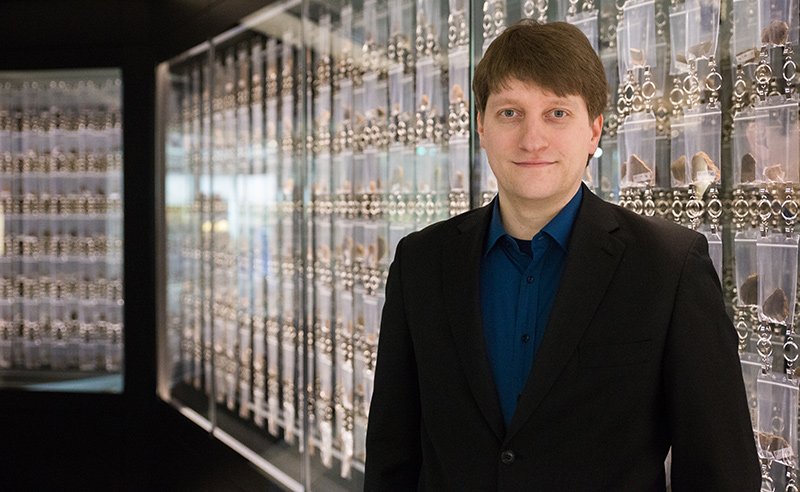“Our Modern Culture Cannot Be Understood Without Its Ancient Foundations“
Eleven questions for Jun.-Prof. Dr Marian Nebelin, who has held the Junior Professorship of Antiquity and Europe with Special Emphasis on the Reception of Antiquity since October 2015
-

Traces of antiquity in Chemnitz: Jun.-Prof. Dr Marian Nebelin in the fragment collection of the State Museum for Archaeology in Chemnitz – fragments of ceramic vessels are the most common archaeological objects. Photo: Steve Conrad
Jun.-Prof. Dr Marian Nebelin (34) has held the Junior Professorship of Antiquity and Europe with Special Emphasis on the Reception of Antiquity since October 2015. In eleven answers, he gives “University News” readers a glimpse into his background, his goals and his time in Chemnitz.
What does it mean to specialize in Antiquity and Ancient Europe with Special Emphasis on the European Reception of Antiquity?
The junior professorship unites two closely related emphases within the historical sciences: on the one hand, I deal with Europe’s origins in ancient cultures; ultimately I focus on their history as a precursor to the present. This is a traditional focus of Classics. On the other hand, I deal with perceptions, representations and uses of antiquity in later periods; this is the domain of the reception of antiquity.
The TU Chemnitz is the right choice for me as a professor, because…
…of the extremely welcoming and inspiring working environment as well as the interested and open-minded students.
Can you tell us a bit about your academic career so far?
In Dresden and Paris I studied history, protestant theology and philosophy/ethics. Afterwards, I received a yearlong graduate scholarship from the Friedrich Ebert Foundation, and worked as a research associate in the field of ancient history at the Humboldt University of Berlin from 2010 until I took this position in Chemnitz. Prior to that, I completed my doctoral thesis on Cicero’s semantics of politics.
Describe your years of study in only a few words.
My years of study were free, political, exciting, formative, filled with lots of reading, horizon-broadening, but then eventually also a bit restrictive and then they were over.
Did you have role models during your studies who encouraged you to pursue a scientific career?
Everyone needs to decide on their own if the study of humanities is right for them. But of course there are people who influence me as a scientist until today. During my years of study, the following people set good examples for me: My father, who is also a modern historian and with whom I share a focus on politics, my doctoral supervisor Martin Jehne, to whose pragmatic understanding of institutional history (and sense of humor) I owe a lot, and my wife, who is following a similar but not identical path as an ancient historian.
Do you have any advice for young students and graduates?
Study only what truly interests you. Only study the humanities if you love to read and write. But don’t shy away from hard work: whatever you do should be your passion and, in science, passion and struggle sometimes go hand in hand. But in the end, passion prevails.
What would you like to achieve in your teachings in the future?
I want to inspire students to engage with ancient cultures. It is a matter of raising awareness that history is still relevant in the present day: our modern culture cannot be understood without its ancient foundations.
What impact does your research have at the TU Chemnitz?
My main emphasis is on the history of politics. I am basically interested in how people and cultures have realized and institutionalized their coexistence, but also their conflicts. It is especially interesting to consider how aware ancient cultures were of the precariousness of their own collective survival and how this was particularly relevant for them. How these culturally formed perceptions of politics continue to have an effect – for example how modern democracy developed from antiquity – characterizes the field of the history of reception, my second area of interest.
There are around 45,000 professors at German universities. What distinguishes you from all others?
Among 45,000 professors, the question instead should be: what unifies us?
What is your favorite place to show guests in Chemnitz?
It definitely depends on who is visiting, but certainly the Karl Marx Monument.
How do you play a part in the life of the city?
Historical science makes the most sense when it is of direct interest even to non-historians. For this reason, historians in the TU Chemnitz Institute for European History work not only on their publications but also in cooperation with museums and local associations to create a direct connection with Chemnitz residents. I am no exception and I am currently working on arranging such collaborations.
(Translation: Sarah Wilson)
Katharina Thehos
29.03.2016




